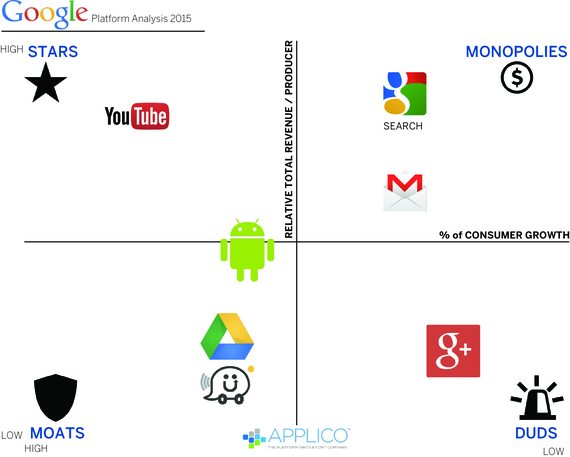Perspective by Applico Founder and CEO Alex Moazed
Google's future is still tied to the desktop in a mobile-first world with Search as its only moneymaking platform.
With two long-standing rising stars, YouTube and Android, how motivated is Google to create another cash cow?
Gmail, Search, YouTube, Google Drive, G-Chat are all desktop first, mobile second. Growth in its desktop products is slowing while the company still hasn't figure out how to create a highly profitable mobile-first platform. Google built its business for the desktop Internet, but other companies like Facebook have successfully transitioned to mobile. Has Google's search monopoly softened its competitive drive?
Leadership Needs a Platform Focus
Revenue grew $20 billion from $46 billion in 2012 to $66 billion in 2014. Yet, EBITDA only grew $2 billion. Myriad far reaching projects have been announced and shuttered and high turnover at the executive level continues.
Search is under attack.
YouTube should be profitable.
Android should be monetized and controlled.
Moats should be created around their rising stars and eventual monopolies, YouTube & Android.
And, all of this could've been finished by now with the right focus.

Applico's Platform Innovation Matrix (more detail on our matrix)
Search Under Increasing Pressure
80% of time spent on mobile phones is spent in apps. This fact is bad news for Google, as it means users are searching inside of apps instead of on Google. Google is trying to combat this separation by introducing app indexing, which allows users on Google search to open a search result within an app. For instance, if you look up the film "Her" on Google, you're presented options to open up a search result inside an app. This is called deep linking, and it's a quickly expanding industry within mobile.
If Google can establish a foothold in this area, AdWords for deep links could be a very lucrative business for it moving forward. But while app indexing will help Google deliver value in an app-focused world, it still doesn't eradicate the threat of people spending less time on the Google search platform and more time inside apps. In order to replicate its desktop success, Google needs to figure out how to become the way to navigate apps.
Competitive threats are also increasing for Search with Facebook search reaching one-third of Google's total search volume. There also have been rumblings that Apple will soon launch its own search engine.
10 Years and YouTube Still Not Profitable
YouTube was founded in February 2005 and still has not reached profitability despite being the predominant video destination online. For Facebook, mobile ads for apps has been a huge boon for its business. What is YouTube's "killer" mobile-first ad unit? The clock is ticking.
YouTube is launching a paid subscription service and a new ad unit called TrueView. After the initial rollout, it is rumored that specific ad units will be launched like one for downloading apps. We're not sure why it has taken so long for specialized ad units to be rolled out. And, they haven't been implemented on mobile yet. YouTube certainly has runway to get to profitability; however, they could have moved faster.
Does Google believe in YouTube's potential? It lost the deal to purchase Twitch to Amazon over a rumored disagreement on the break-up fee if the FTC turned down the deal. Adding Twitch to its online-video portfolio would have immediately given the combined YouTube and Twitch offering a clear path to growth and profitability within the next few years.
Android has spun out of control
China is a model for what can go wrong when Google doesn't exert control over what companies do with Android. Google doesn't operate an app store in China since it avoids doing business in the country. Its absence has created the opportunity for competitors to open their own app stores and customize forked versions of Android to promote their offerings. This is exactly what Xiaomi is doing, and while the threat is contained because Xiaomi's presence mostly is limited to China, Google could be put in more defensive position if Xiaomi decides to expand globally.
An open Android strategy made sense eight years ago, as it helped Google fend off Apple's iPhone threat and penetrate the market. But the strategy is now working against Google, as forked versions of Android enable competitors to leverage the Android developer community relatively easily.
Google's lack of control of Android is reflective of its inability to evolve it into a real profit center.
Similar to YouTube, the lack of mature moats to protect Android raises concerns about Google's confidence in turning Android into a cash cow.
Defensive Moats Very Nascent
Google Now (a Siri competitor) and its ability to serve as the life-coordination hub for users is still in its beginning stage as a development platform, having integrated 40 different apps.
And as social networks become increasingly integrated into coordination platforms, how will Google compensate for the brutal demise of Google+ and its deliberate lack of integration with Facebook? With the demise of Google+, Google lacks an identity platform. Apple has TouchID and Facebook has its social graph.
As smartphones replace our wallet and coordinate more of our lives, will Gmail be enough of an identity platform? It doesn't look like it, as more and more activity is moving away from email and into mobile messaging.
Apple Pay already has 50% of Google Wallet's market share and is increasingly steadily. The introduction of payments on Facebook Messenger compounds this issue for Google. Switching costs are high for mobile wallets. The company that figures this first out will be in an advantageous position for the future. But with the lack of a viable identity platform, mobile payments will be a trouble area for Google.